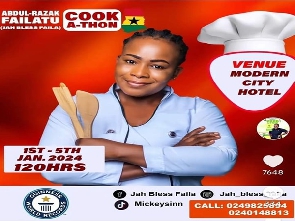 Chef Faila is seeking to break the cook-a-thon record
Chef Faila is seeking to break the cook-a-thon record
The suggestion, even from some of our northern folks, that the record-breaking attempt should have taken place in Accra instead of Tamale is shaped by years of media programming through movies.
And this is not just a Ghanaian-specific case but something that cuts across the world.
People who control their own narrative wield the power to tell their own stories in a positive light.
When I was a child, I thought every person in the West was rich, every Chinese was skillful in martial arts or karate, every Indian was a great singer or dancer, every black person in America lived in either a ghetto, was a drug pusher, or belonged to a gang.
Take African movies, for instance. Is it not curious that the richest man in Africa is Muslim, but in most Nigerian movies, Musah is the gateman?
Have we ever questioned why Atongo or Ibrahim with a signature mockery accent, is always cast as the gateman in Ghanaian movies?
Why is it that Efo is always projected as an alcoholic or juju man in most Kumawood movies, yet it is not as if there is a lack of negative stories about those telling the story?
As the adage goes, “Until the lions have their own historians, the tales of hunting will always glorify the hunter.”
As we wish Chef Faila the very best in her record-breaking challenge, let’s also take charge of telling our own stories.
The current conflict in Palestine is in part the early realisation of a people who documented their experiences or history and sold it to the rest of the world as the dominant piece of narrative.
The story of Moses encountering God in the wilderness or God promising to give the land of Palestine to the children of Israel over 4000 years ago is relevant today simply because it was documented.